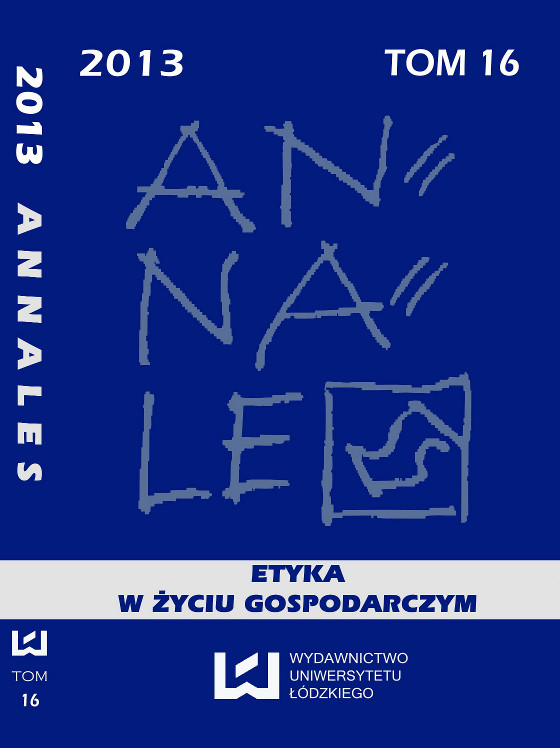Wynagrodzenia małżonków i kohabitantów
DOI:
https://doi.org/10.18778/1899-2226.16.19Słowa kluczowe:
marriage, cohabitation, earnings, marriage premium, comparisonAbstrakt
It is often believed that marriage and cohabitation do not lie in the area of interest of economics. However, a trial of economic analysis of romantic relationships is possible and leads to interesting conclusions. Researchers from Western Europe, such as Cohen (2003), Richardson (2000), and Stratton (2002), suggest that not only the choice of romantic partner but also the form of our relationship is crucial. The issue of a relationship’s legalisation has a big impact on the quality and persistence of union as well as on the level of earnings of the couple. Husbands get a, so called, ‘marriage premium’ – they earn more than informal partners. In Polish literature the topic of marriage and cohabitation is analysed very rarely. The aim of the thesis is to discuss differences between the earnings of spouses and cohabitating partners and to present the results of research conducted, which suggest that marriage is related to a higher level of earnings. As the analyses presented show, cohabitation has become a serious issue for present society. We should decide whether the growing popularity of informal relationships should be stopped. It seems that cohabitation is ethically doubtful due to its negative impact on couples as well as on the whole of societyBibliografia
CBOS, Kontrowersje wokół różnych zjawisk dotyczących życia małżeńskiego i rodzinnego. Komunikat z badań, Warszawa 2008.
Google Scholar
Goryniak M., Specyficzne problemy par żyjących w związkach kohabitacyjnych. Wskazania do terapii [w:] Postępy psychoterapii, tom IV. Problemy małżeństwa i rodziny, red. L. Gapik, A. Woźniak, Wydawnictwo „INTERFUND”, Poznań 2002, s. 83-86.
Google Scholar
Grossbard S., On the Economics of Marriage. A Theory of Marriage, Labor and Divorce, Westview Press, Boulder, 1993.
Google Scholar
Hewitt B., M. Western, J. Baxter, Marriage and Money: The Impact of Marriage on Men's and Women's Earnings, Negotiating the Life Course Discussion Paper Series DP 007, July 2002.
Google Scholar
Janicka I., Kohabitacja a małżeństwo w perspektywie psychologicznej. Studium porównawcze, Wydawnictwo UŁ, Łódź 2006.
Google Scholar
Janicka I., Perspektywy związków kohabitacyjnych [w:] Psychologia rodziny. Małżeństwo i rodzina wobec współczesnych wyzwań, red. T. Rostowska, Wydawnictwo Difin, Warszawa 2009.
Google Scholar
Lerman R., Marriage and the Economic Well-Being of Families with Children: A Review of the Literature, Urban Institute and American University, 2002.
Google Scholar
Light A., Gender Differences in the Marriage and Cohabitation Income Premium, Departament of Economics The Ohio State University, December 2002.
Google Scholar
Mały rocznik statystyczny 2011, GUS, Warszawa 2011.
Google Scholar
Podstawowe informacje o rozwoju demograficznym Polski w latach 2000-2009. Notatka informacyjna, GUS, Departament Badań Demograficznych, 2010.
Google Scholar
Ribar D., What Do Social Scientists Know About Benefits of Marriage? A Review of Quantitative Methodologies, IZA DP No. 998, January 2004.
Google Scholar
DOI: https://doi.org/10.2139/ssrn.500887
Stolarska B., Styl przywiązania i płeć psychologiczna partnerów kohabitujących a jakość ich związku, praca magisterska napisana pod kierunkiem prof. dr hab. Iwony Janickiej, Łódź 2011.
Google Scholar
Pobrania
Opublikowane
Jak cytować
Numer
Dział
Licencja

Utwór dostępny jest na licencji Creative Commons Uznanie autorstwa – Użycie niekomercyjne – Bez utworów zależnych 4.0 Międzynarodowe.









